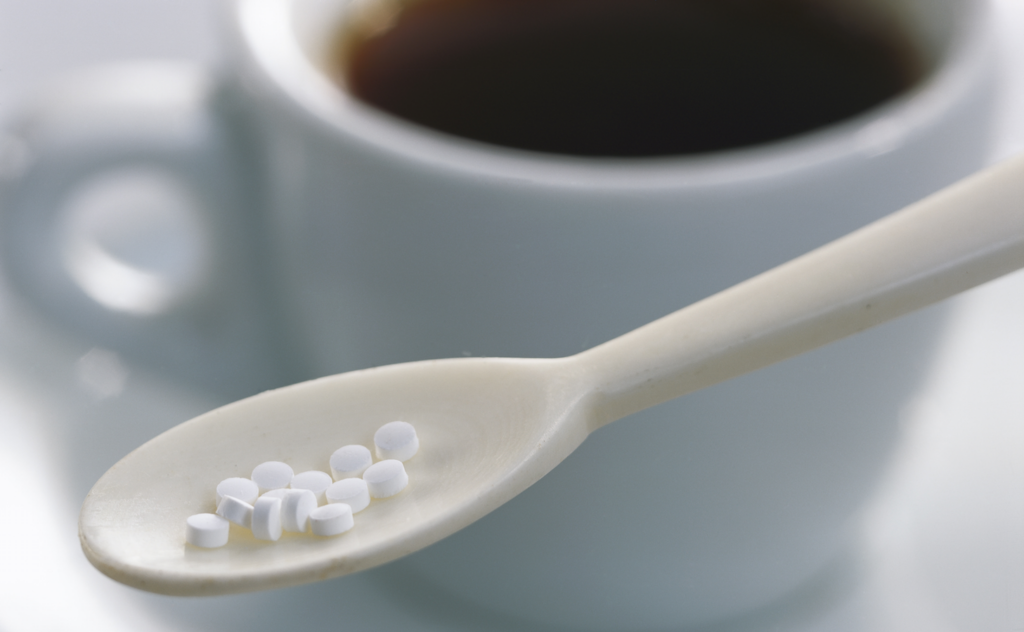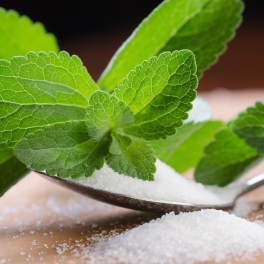In a society full of pressures of being successful, pretty, and thin as a part of the ideal living situation and self-acceptance, making the “right” choices is becoming more difficult than ever. Even the smallest everyday tasks like drinking a morning coffee or tea are suddenly perceived of much higher importance as the ever-changing health claims are going beyond the common sense. The focus here is on sweeteners and the controversy around them. The question arises – should we drink ourselves into artificial lives or are we being deceived from the first sip of our “oh-so-sweet” morning coffee?
The alleged benefits under scrutiny
Teeth-whitening dental expert
* Xylitol – Already in 1980s, the potential benefits of artificial sweeteners underwent a series of scientific exams to indicate their health benefits. In a study conducted by Kauko Makinen from the Michigan School of Dentistry, 2 groups of children were given chewing gums with/without xylitol to chew 3 times a day over 2 years. The results were amazing! The group of kids with xylitol gum acquired much fewer or no cavities over the testing period and the xylitol protection continued 2 years after the experiment. Want some free dental treatment? Go chew xylitol gum.
* Aspartame – Another commonly-used sweetener in chewing gums, aspartame, has caused a huge wave of debate over the Internet when in 2007 in a documentary “What´s really in our food” a woman from New Zealand confessed about her experience with aspartame and it wasn´t nice at all. She ate nothing but aspartame-sweetened chewing gum for two weeks due to a stressful period at work and eventually ended up in hospital with severe depression and malnutrition. Along the way, she lost 13 kg and her teeth were whiter than ever. Her mental state though was clearly attributed to the amount of aspartame in her diet and was classified as irreversible. Worth it? I´d say no.
Diabetes vs. dieting
Since artificial sweeteners have no or only a small impact on blood sugar, it is a huge advantage for people suffering from diabetes. They have no other choice; however, a lot of people who have completely healthy bodies (for now) are taking in huge amounts of artificial sweeteners just to lose weight. Apart from the fact that it may be harmful, it seems it doesn´t even work!
An article in New York Daily News suggests that consuming artificial sweeteners impairs the brain´s natural pleasure center by reducing dopamine levels, so after drinking a no-calorie cola drink, because your body´s getting sweetness but no nutrition, it will make you crave fatty and sugary high-calorie foods later.
Control the amount
The problem with using sweeteners as a weight-loss aid is that we tend to overdo it. When you start using sweeteners to sweeten coffee and tea, then bake some cake with it, and eventually you end up sweetening your smoothies, yoghurts, and sprinkling it on your morning toast, you probably start to realize something is wrong here. If sweeteners are present in 50% of your daily intake, it is very likely that you will start experiencing very unpleasant side effects. Besides the food cravings and depression, you may experience muscle tension, severe headache, diarrhea, and stomach cramps. A study by European Ramazzini Foundation in Bentivoglio, Italy has even linked usage of aspartame to developing cancer. If we see a brighter side of this, none of the aforementioned side effects occur when respecting the recommended daily amounts. (See: http://www.fitday.com/fitness-articles/nutrition/healthy-eating/4-artificial-sweeteners-their-fda-safe-levels.html)
Go natural & low-calorie
* Maple syrup – If you still feel like you need to substitute for sugar or honey, try to go natural and buy 100% maple syrup. It is packed with antioxidants, minerals, and has anti-inflammatory properties protecting your heart and boosting immune system.
* Stevia – it is one of the youngest sweeteners so it hasn´t gone through a major research but with the information we´ve gotten we can say it is the safest form of sweeteners. It has zero calories so it´s beneficial in weight-loss efforts, it doesn´t affect blood sugar at all so it is suitable for diabetics as well as ordinary people without health conditions, and tested with a higher doses than recommended it was actually proven to regulate blood pressure and heartbeat. The only downfall with stevia is that when baking, you have to add eggs, fruit puree, or yoghurt on the top of stevia substitution as a bulking agent.
by Katarína Vicová
References:
Davis, J. (2014). [picture]. Canadian cuisine, eh? You know you´re Canadian when… Retrieved from: http://www.flightnetwork.com/blog/canadian-cuisine-eh-know-youre-canadian/
Holt, S. (2012). [picture]. Sugar substitutes or sugar in your coffee? Retrieved from: http://www.takepart.com/article/2012/11/26/sugar-substitutes-artificial-sweeteners
Lovett, R. (2006, May 6). The healthy option? New Scientist, 190, 40-43.
McGill, J. (2015). [picture]. Stevia – a natural sweetener. Retrieved from: http://www.diabeticdiscountoffers.com/stevia-a-natural-sweetener/
Medical News Today (2014). What is stevia? What are the health benefits of stevia? Retrieved from: http://www.medicalnewstoday.com/articles/287251.php#does_stevia_have_health_benefits
Morin, T. A. (2003, August). Do you know what´s really causing your headache? Natural Health, 33.
New York Daily News (2013). Artificial sweeteners may sabotage weight loss by upping sugar cravings. Retrieved from: http://www.nydailynews.com/life-style/health/artificial-sweeteners-sabotage-weight-loss-article-1.1467084
Weiss, R. (1988, October 22). Sweet defeat for dental caries. Science News, p. 270. Retrieved from Academic Search Premier database.
Zerbe, L. (2015). The 5 worst sweeteners (+ 5 healthy alternatives). Retrieved from: http://www.rodalesorganiclife.com/food/5-worst-sweeteners-5-healthy-alternatives/good-guy-5-real-maple-syrup



